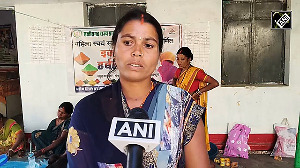 In the midst of a bitter power tussle, Delhi Chief Minister Arvind Kejriwal on Tuesday met Lt Governor Najeeb Jung and discussed functioning of the elite Anti-Corruption Bureau, a day after Delhi high court ruled that it has authority to probe central government officials, including Delhi police personnel.
In the midst of a bitter power tussle, Delhi Chief Minister Arvind Kejriwal on Tuesday met Lt Governor Najeeb Jung and discussed functioning of the elite Anti-Corruption Bureau, a day after Delhi high court ruled that it has authority to probe central government officials, including Delhi police personnel.
In the meeting which lasted for around 20 minutes, Kejriwal apprised Jung of the high court ruling about the powers of the Anti-Corruption Bureau and his views on the issue, sources said.
This is the first meeting between two since the confrontation began.
Deputy Chief Minister Manish Sisodia and Chief Secretary K K Sharma accompanied Kejriwal.
The meeting came on a day when a two-day session of the Delhi assembly began which has been called to deliberate on the Centre's notification giving absolute powers to the LG in appointment of bureaucrats and issues relating to police and public order.
In the May 21 notification, the Union home ministry had also barred the ACB from registering any case against officers and political functionaries of the central government.
Sources said Kejriwal briefed the Lt Governor about the agenda of the two-day assembly session and expressed his readiness to work with Jung to ensure effective governance.
After the notification was issued, Kejriwal had launched a frontal attack on the Centre, accusing it of "back-stabbing" the people of the city by "siding" with the Lt Governor to run Delhi through "backdoor" and protect the corrupt.
The appointment of senior bureaucrat Shakuntala Gamlin as acting Chief Secretary by the LG last week had triggered a full-blown war between the ruling AAP and Jung, with Kejriwal questioning the LG's authority and accusing him of trying to take over the administration.
Both sides had exchanged a number of letters questioning each other's authority in transfer and posting of officials as well as on certain other issues.
The Delhi high court on Monday had termed as "suspect" the Centre's recent notification barring the ACB from acting against its officers in criminal offences and held that the LG cannot act in his discretion.






 © 2025
© 2025